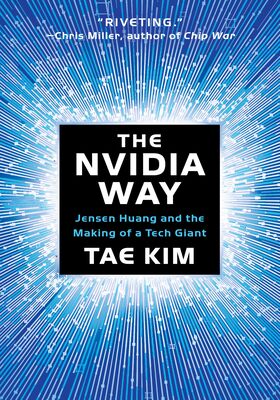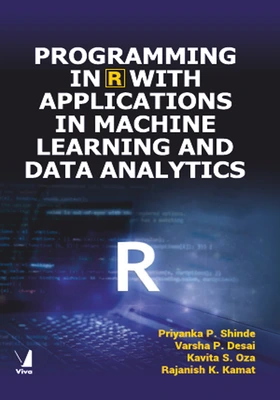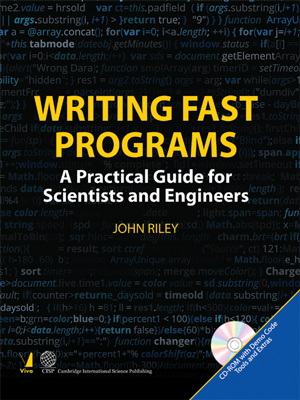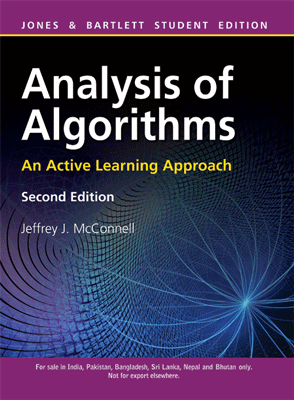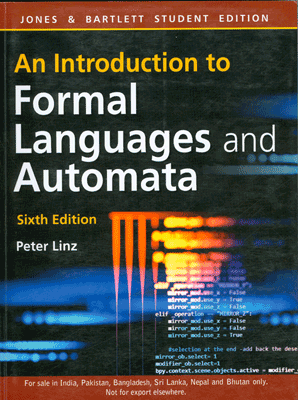Computer Science Illuminated, 6/e
Computer Science Illuminated, 6/e
₹1,345.50 ₹1,495.00 Save: ₹149.50 (10%)
Go to cartISBN: 9789384323097
Bind: Paperback
Year: 2018
Pages: 730
Size: 165 x 229 mm
Publisher: Jones & Bartlett Learning
Published in India by: Jones & Bartlett India
Exclusive Distributors: Viva Books
Sales Territory: India, Nepal, Pakistan, Bangladesh, Sri Lanka
Description:
Fully revised and updated, the sixth edition of the best-selling text Computer Science Illuminated retains the accessibility and in-depth coverage of previous editions, while incorporating all-new material on cutting-edge issues in computer science. Authored by the award-winning Nell Dale and John Lewis, Computer Science Illuminated's unique and innovative layered approach moves through the levels of computing from an organized, language-neutral perspective.
Designed for the introductory computing and computer science course, this student-friendly Sixth Edition provides students with a solid foundation for further study, and offers non-majors a complete introduction to computing.
A Collection of programming language chapters are available as low-cost bundling options. Available chapters include: Java, C++, Python, Alice, SQL, VB, NET, RUBY, Perl, Pascal, and JavaScript.
- Completely revised sections on HTML and CSS
- Updates regarding Top-level Domains, Social Networks, and Google Analytics
- All-new section on internet management, including ICANN control and net neutrality
- New design, including fully revised figures and tables
- New and updated Did You Know Callouts are included in the chapter margins
- New and revised Ethical Issues and Biographies throughout emphasize the history and breadth of computing
Target Audience:
This book is helpful for all students and academicians of Computer Science.
Contents:
Part 1: Laying the Groundwork
Chapter 1: The Big Picture • Computing Systems • Layers of a Computing System Abstraction • The History of Computing • A Brief History of Computing Hardware • A Brief History of Computing Software Predictions • Computing as a Tool and a Discipline • Summary • Ethical Issues: Digital Divide • Key Terms • Exercises • Thought Questions
Part 2: The Information Layer
Chapter 2: Binary Values and Number Systems • Numbers and Computing • Positional Notation • Binary, Octal, and Hexadecimal • Arithmetic in Other Bases • Power-of-2 Number Systems • Converting from Base 10 to Other Bases • Binary Values and Computers • Summary • Ethical Issues: The FISA Court • Key Terms • Exercises • Thought Questions
Chapter 3: Data Representation • Data and Computers • Analog and Digital Data • Binary Representations • Representing Numeric Data • Representing Negative Values • Representing Real Numbers • Representing Text • The ASCII Character Set • The Unicode Character Set • Text Compression • Representing Audio Data • Audio Formats • The MP3 Audio Format • Representing Images and Graphics • Representing Color • Digitized Images and Graphics • Vector Representation of Graphics • Representing Video • Video Codecs • Summary • Ethical Issues: The Fallout from Snowden's Revelations • Key Terms • Exercises • Thought Questions
Part 3: The Hardware Layer
Chapter 4: Gates and Circuits • Computers and Electricity • Gates • NOT Gate • AND Gate • OR Gate • XOR Gate • NAND and NOR Gates • Review of Gate Processing • Gates with More Inputs • Constructing Gates • Transistors • Circuits • Combinational Circuits • Adders • Multiplexers • Circuits as Memory • Integrated Circuits • CPU Chips • Summary • Ethical Issues: Codes of Ethics • Key Terms • Exercises • Thought Questions
Chapter 5: Computing Components • Individual Computer Components • The Stored-Program Concept • von Neumann Architecture • The Fetch?Execute Cycle • RAM and ROM • Secondary Storage Devices • Touch Screens • Embedded Systems • Parallel Architectures • Parallel Computing • Classes of Parallel Hardware • Summary • Ethical Issues: Is Privacy a Thing of the Past? • Key Terms • Exercises • Thought Questions
Part 4: The Programming Layer
Chapter 6: Low-Level Programming Languages and Pseudocode • Computer Operations • Machine Language • Pep/8: A Virtual Computer • A Program Example • Hand Simulation • Pep/8 Simulator • Assembly Language • Pep/8 Assembly Language • Assembler Directives • Assembly-Language Version of Program Hello • A New Program • A Program with Branching • A Program with a Loop • Expressing Algorithms • Pseudocode Functionality • Following a Pseudocode Algorithm • Writing a Pseudocode Algorithm • Translating a Pseudocode Algorithm • Testing • Summary • Ethical Issues: Software Piracy • Key Terms • Exercises • Thought Questions
Chapter 7: Problem Solving and Algorithms • How to Solve Problems • Ask Questions • Look for Familiar Things • Divide and Conquer • Algorithms • Computer Problem-Solving Process • Summary of Methodology • Testing the Algorithm • Algorithms with Simple Variables • An Algorithm with Selection • Algorithms with Repetition • Composite Variables • Arrays • Records • Searching Algorithms • Sequential Search • Sequential Search in a Sorted Array • Binary Search • Sorting • Selection Sort • Bubble Sort • Insertion Sort • Recursive Algorithms • Subprogram Statements • Recursive Factorial • Recursive Binary Search • Quicksort • Important Threads • Information Hiding • Abstraction • Naming Things • Testing • Summary • Ethical Issues: Open-Source Software • Key Terms • Exercises • Thought Questions
Chapter 8: Abstract Data Types and Subprograms • What Is an Abstract Data Type? • Stacks • Queues • Lists • Trees • Binary Trees • Binary Search Trees • Other Operations • Graphs • Creating a Graph • Graph Algorithms • Subprograms • Parameter Passing • Value and Reference Parameters • Summary • Ethical Issues: Workplace Monitoring • Key Terms • Exercises • Thought Questions
Chapter 9: Object-Oriented Design and High-Level Programming Languages • Object-Oriented Methodology • Object Orientation • Design Methodology • Example • Translation Process • Compilers • Interpreters • Programming Language Paradigms • Imperative Paradigm • Declarative Paradigm • Functionality in High-Level Languages • Boolean Expressions • Data Typing • Input/Output Structures • Control Structures • Functionality of Object-Oriented Languages • Encapsulation • Classes • Inheritance • Polymorphism • Comparison of Procedural and Object-Oriented Designs • Summary • Ethical Issues: Hoaxes and Scams • Key Terms • Exercises • Thought Questions
Part 5: The Operating Systems Layer
Chapter 10: Operating Systems • Roles of an Operating System • Memory, Process, and CPU Management • Batch Processing • Timesharing • Other OS Factors • Memory Management • Single Contiguous Memory Management • Partition Memory Management • Paged Memory Management • Process Management • The Process States • The Process Control Block • CPU Scheduling • First Come, First Served • Shortest Job Next • Round Robin • Summary • Ethical Issues: Medical Privacy: HIPAA • Key Terms • Exercises • Thought Questions
Chapter 11: File Systems and Directories • File Systems • Text and Binary Files • File Types • File Operations • File Access • File Protection • Directories • Directory Trees • Path Names • Disk Scheduling • First-Come, First-Served Disk Scheduling • Shortest-Seek-Time-First Disk Scheduling • SCAN Disk Scheduling • Summary • Ethical Issues: Privacy: Opt-In or Opt-Out? • Key Terms • Exercises • Thought Questions
Part 6: The Applications Layer
Chapter 12: Information Systems • Managing Information • Spreadsheets • Spreadsheet Formulas • Circular References • Spreadsheet Analysis • Database Management Systems • The Relational Model • Relationships • Structured Query Language • Database Design • E-Commerce • Summary • Ethical Issues: Politics and the Internet: The Candidate's View • Key Terms • Exercises • Thought Questions
Chapter 13: Artificial Intelligence • Thinking Machines • The Turing Test • Aspects of AI • Knowledge Representation • Semantic Networks • Search Trees • Expert Systems • Neural Networks • Biological Neural Networks • Artificial Neural Networks • Natural Language Processing • Voice Synthesis • Voice Recognition • Natural Language Comprehension • Robotics • The Sense?Plan?Act Paradigm • Subsumption Architecture • Physical Components • Summary • Ethical Issues: Initial Public Offerings • Key Terms • Exercises • Thought Questions
Chapter 14: Simulation, Graphics, Gaming, and Other Applications • What Is Simulation? • Complex Systems • Models • Constructing Models • Specific Models • Queuing Systems • Meteorological Models • Computational Biology • Other Models • Computing Power Necessary • Computer Graphics • How Light Works • Object Shape Matters • Simulating Light • Modeling Complex Objects • Getting Things to Move • Gaming • History of Gaming • Creating the Virtual World • Game Design and Development • Game Programming • Summary • Ethical Issues: Gaming as an Addiction • Key Terms • Exercises • Thought Questions
Part 7: The Communications Layer
Chapter 15: Networks • Networking • Types of Networks • Internet Connections • Packet Switching • Open Systems and Protocols • Open Systems • Network Protocols • TCP/IP • High-Level Protocols • MIME Types • Firewalls • Network Addresses • Domain Name System • Who Controls the Internet? • Cloud Computing • Summary • Ethical Issues: The Effects of Social Networking • Key Terms • Exercises • Thought Questions
Chapter 16: The World Wide Web • Spinning the Web • Search Engines • Instant Messaging • Weblogs • Cookies • Web Analytics • HTML and CSS • Basic HTML Elements • Tag Attributes • More About CSS • More HTML Elements • Interactive Web Pages • Java Applets • Java Server Pages • XML • Social Networks • Summary • Ethical Issues: Gambling and the Internet • Key Terms • Exercises • Thought Questions
Chapter 17: Computer Security • Security at All Levels • Information Security • Preventing Unauthorized Access • Passwords • CAPTCHA • Fingerprint Analysis • Malicious Code • Antivirus Software • Security Attacks • Cryptography • Protecting Your Information Online • Security and Portable Devices • WikiLeaks • Summary • Ethical Issues: Blogging • Key Terms • Exercises • Thought Questions
Part 8: In Conclusion
Chapter 18: Limitations of Computing • Hardware • Limits on Arithmetic • Limits on Components • Limits on Communications • Software • Complexity of Software • Current Approaches to Software Quality • Notorious Software Errors • Problems • Comparing Algorithms • Turing Machines • Halting Problem • Classification of Algorithms • Summary • Ethical Issues: Therac-25: Anatomy of a Disaster • Key Terms • Exercises • Thought Questions
Glossary • Endnotes • Index
About the Authors:
Nell Dale, PhD - University of Texas, Austin
Nell Dale received a B.S. in Mathematics and Psychology from the University of Houston, a M.A. in Mathematics, from the University of Texas at Austin, and a Ph.D. in Computer Sciences from the University of Texas at Austin. Nell Dale has been on the faculty at the University of Texas, Austin since 1975. She teaches occasionally but concentrates on computer science education, writing, traveling, tennis, and bridge -- and her family of course.
John Lewis, PhD - Virginia Tech, Blacksburg, Virginia
John Lewis is a leading educator and author in the field of computer science. He has written a market-leading textbook on Java software and program design. After earning his undergraduate degree, M.S., and Ph.D. in computer science at Virginia Tech, John joined the faculty of the Department of Computing Sciences at Villanova University. He has received numerous teaching awards, including the University Award for Teaching Excellence and the Goff Award for Outstanding Teaching. His professional interests include object-oriented technologies, multimedia, and software engineering. In addition to his teaching and writing, John actively participates in the Special Interest Group on Computer Science Education (SIGCSE), and finds time to spend with his family or in his workshop.

